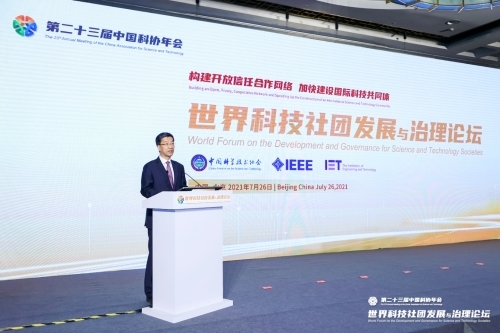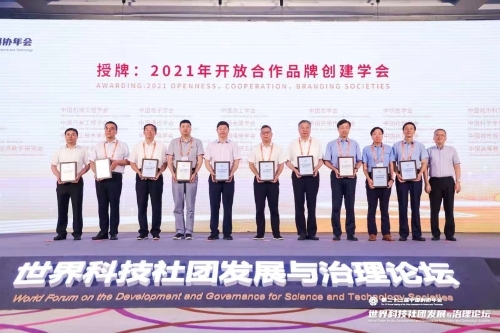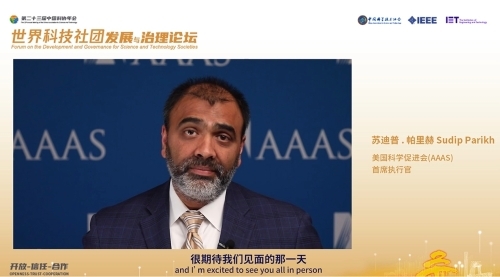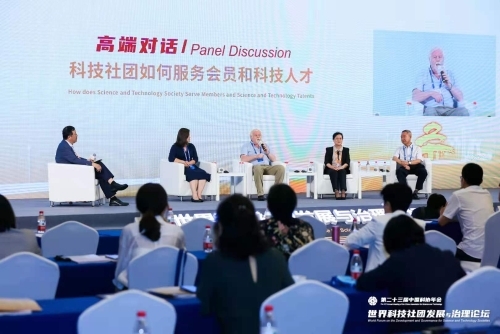
-
Forum on the International Development and Governance of Science and Technology Associations Held
2021-07-26
On July 26, Forum on the International Development and Governance of Science and Technology Associations during the 23rd Annual Meeting of the China Association for Science and Technology (CAST) was held in Beijing. The forum was co-sponsored by CAST, Institute of Electrical and Electronics Engineers (IEEE), and Institute of Engineering and Technology (IET), with the theme “Building an Open and Trusting Cooperation Network. Accelerating the Constructing of an International Scientifific and Technological Community” . Keynote reports and high-end dialogues were carried out around topics such as carbon emissions, international science and technology awards, international science and technology governance, human life and health, talent growth and membership services. Huai Jinpeng, Secretary of the Leading Party Members Group, Executive Vice President and Chief Executive Secretary of CAST, Sudip Parikh, CEO of American Association for the Advancement of Science (AAAS), and Nigel Fine, CEO of IET attended the forum and delivered speeches.
In his speech, Huai Jinpeng pointed out that science and technology are the core driving force for the progress of human civilization, and the unremitting pursuit of discovering nature and enhancing human well-being has always been the value and belief of the science and technology community. How to transcend limitations, explore truth, and how to deal with current challenges and future changes is an important mission of the science and technology community. We must adhere to the scientific spirit, persist in endless exploration, and regard the enhancement of human well-being as the eternal pursuit. We shall face the challenge and realize that science is not omnipotent, but the values of the science and technology community are to guide the direction of problem-solving, so that openness, trust, and cooperation become the qualities of science and technology communities.
Huai Jinpeng emphasized that openness is a sign of the progress of human civilization and the endowment of the science and technology community. Trust is the most precious and scarce quality in contemporary society, and it is the cornerstone of progress in science and technology. Cooperation is the choice of scientifically responding to challenges, and it is also the basis for innovation and creation. We must seek truth from science to create knowledge, build a reasonable academic community, benefit society with science and technology, build a virtuous value community, improve the well-being of human-kind and build a “people-oriented” community with a shared future.
Huai Jinpeng expressed that it is necessary to jointly build a global cooperation network, establish a cross-border, diversified and diverse collaborative exchange mechanism, build an open and shared international innovation cooperation network, promote digital transformation and development, promote open science, and jointly build an innovative ecology with diversified, inclusive and open cooperation. We must condense common challenges, jointly deal with human challenges and conflicts, use strategic issues to guide open communication, and create an open and trusted communication platform. It is necessary to establish an effective negotiation and communication mechanism, hoping that science and technology serve policies and policies support science and technology development, deal with important issues such as science and technology ethics and self-discipline in the science and technology community, and enhance global science and technology governance capabilities through open, mutual trust and cooperation.
Meng Qinghai, Vice President and Executive Secretary of CAST, presented award certificates to the 2021 exemplary societies in open cooperation. . In recent years, CAST has actively supported the international development of its affiliated national societies and encouraged deepening mutual trust exchanges and cooperation with international counterparts. This year, CAST set up a special open cooperation demonstration project to guide national societies to accelerate the construction of open organizations, open platforms and open mechanisms, and continuously improve their open cooperation capabilities.
Wang Jinzhan, member of the Leading Party Members Group and Executive Secretary of CAST, presided over the opening ceremony.
In his speech, Sudip Parikh, CEO of AAAS, pointed out that coping with global problems requires vigorous development of science and technology. This is the consensus concept of the science and technology community to cope with common challenges. Trust is the basic element of any relationship. Within and between countries, we must work together to strengthen trust in science. The peer-to-peer relationship between American and Chinese scientists is crucial to the future of the world. It is hoped that a trust relationship can be established on the basis of integrity and respect for each other and scientific norms, and solutions for decision makers be created via mutual cooperation.
Nigel Fine, CEO of IET said that engineering is used to make the world a better place and to provide support to people in different disciplines, departments, and concerns. The IET has established a very successful partnership with CAST, and has continuously deepened cooperation in strengthening the professional capacity building of engineers, building scientific and technological journals and international exchanges.
Mu Rongping, president of the Chinese Association of Science of Science and S&T Policy Research made a report comprehensively on 2021 annual ranking of the world’s top science and technology societies.
Guo Huadong, honorary chairman of International Digital Earth Association and academician of the Chinese Academy of Sciences (CAS) presided over the keynote speech session of the forum.
Dan Dorner, Secretary General of the Clean Energy Ministerial (CEM), Xiu Long, president of Architectural Society of China (ASC), Sandrine Dixson-Decleve, CO chairman of the Club of Rome, Howard Catton, CEO of the International Council of Nurses (ICN), Hua Ning, senior director of Asia Operations, IEEE, made keynote speeches focusing on sustainable development and carbon emission,international sci-tech awards, international sci-tech governance, common health for mankind, talent growth and membership service。
Liu Zhongfan, vice president of the Chinese Chemical Society and academician of CAS, Qiu Zhiming, vice president of the Chinese ordnance industry society and academician of the Chinese Academy of engineering, Wu Fengchang, vice president of the Chinese society for Environmental Sciences and academician of the Chinese Academy of Engineering, Zhang Zhibin, president of the International Society of Zoological Sciences (ISZS), Lin Zuoming, president of the Chinese Society of Aeronautics and Astronautics (CSAA), together with other presidents and general secretaries of national societies, experts in the field of science and technology organizations and heads of relevant departments of the Ministry of Civil Affairs and CAST, totally over 200 people attended the meeting.
More than 11.3 million people at home and abroad watched the live broadcast.
At the high-level dialogue session, 19 leaders and experts of societies, including Mamphela Lamphele, CO chairman of the Club of Rome, CHUNG Kwok Fai Edwin, president of the Hong Kong Institution of Engineers (HKIE), David g. Evans, distinguished professor of Beijing University of Chemical Technology, had deep discussions and exchanged ideas on the path selection of the scientific and technological community to meet the common challenges of mankind, international scientific and technological exchanges and digital transformation under the influence of the epidemic and how science and technology societies serve members and science and technology talents.
tag:23rd Annual Meeting



